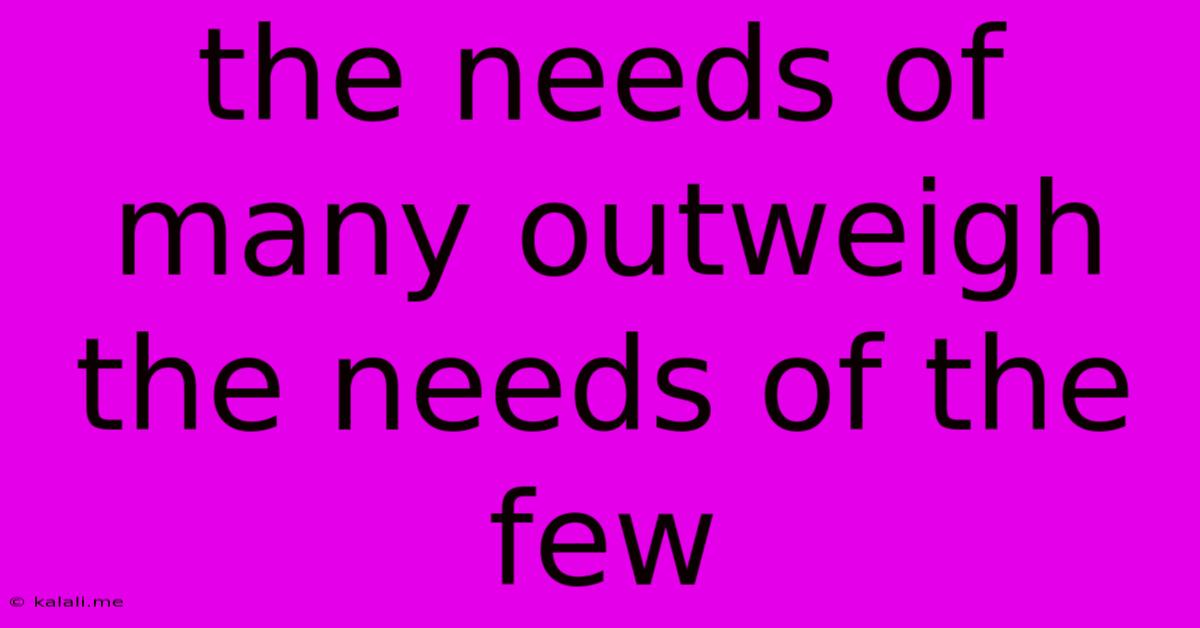The Needs Of Many Outweigh The Needs Of The Few
Kalali
Jun 04, 2025 · 3 min read

Table of Contents
The Needs of the Many Outweigh the Needs of the Few: A Philosophical and Practical Examination
This article explores the age-old ethical dilemma: when the needs of a minority conflict with the needs of a larger group, which should take precedence? The principle that "the needs of the many outweigh the needs of the few" is a cornerstone of many societal structures, but its application is complex and often fraught with ethical challenges. We'll delve into the philosophical underpinnings of this principle, examine its practical implications, and consider situations where its application becomes morally ambiguous.
Utilitarianism: The Foundation of the Many vs. the Few
The statement "the needs of the many outweigh the needs of the few" finds its strongest philosophical backing in utilitarianism. This ethical framework argues that the best action is the one that maximizes overall happiness and well-being for the greatest number of people. A utilitarian perspective prioritizes the collective good over individual interests, even if it means sacrificing the needs of a smaller group to benefit a larger one. This principle is often used to justify policies and decisions that may seem unfair to individuals, but ultimately contribute to the greater good of society. Examples include resource allocation during public health crises, or the implementation of environmental regulations impacting specific industries for the benefit of the wider population.
Practical Applications and Real-World Examples
The principle's application is visible in many areas:
- Public Health: During a pandemic, prioritizing the development and distribution of a vaccine for the general population over providing specialized treatment for a small group with rare complications is a utilitarian approach.
- Resource Allocation: Government budgeting often involves making difficult choices. Funding a project that benefits a large portion of the population, even if it means neglecting smaller, niche initiatives, reflects this principle.
- Environmental Protection: Implementing environmental regulations that impact a particular industry might negatively affect a few businesses, but the long-term benefits for environmental protection and public health outweigh the negative consequences for the few.
- Infrastructure Development: The construction of a new highway system might displace a few families, but the enhanced transportation and economic benefits for a wider community often justify the displacement.
Ethical Challenges and Exceptions
While often justified, the principle's application isn't without its ethical challenges. Several situations highlight the complexities:
- Inherent Inequalities: Applying this principle can exacerbate existing inequalities. If the "many" are already privileged, prioritizing their needs might further marginalize the "few." A thorough and just evaluation of existing power dynamics is crucial before applying this principle.
- Individual Rights vs. Collective Good: The principle can clash with individual rights and freedoms. Balancing the needs of the many with the protection of individual rights is a constant ethical tightrope walk.
- Defining "Needs": What constitutes a "need" is subjective and open to interpretation. Clearly defined criteria are crucial to avoid arbitrary decisions.
- Tyranny of the Majority: A careless application of this principle can lead to the tyranny of the majority, where the rights and needs of minority groups are systematically ignored or suppressed.
Conclusion: A Balancing Act
The principle that "the needs of the many outweigh the needs of the few" provides a valuable framework for making decisions that benefit society as a whole. However, its implementation requires careful consideration of potential ethical pitfalls and a commitment to fairness and equity. A truly just society strives to balance the needs of the many with the protection of the rights and needs of all individuals, regardless of their size or influence. It’s a balancing act, demanding careful deliberation and a nuanced understanding of both the collective good and individual well-being. Only through thoughtful and ethical application can we ensure this principle serves as a tool for progress and not as an instrument of injustice.
Latest Posts
Latest Posts
-
Psql Create Role If Not Exists
Jun 06, 2025
-
Can You Use Personal Checks For Business Account
Jun 06, 2025
-
How Many Years Is Life In Prison In Georgia
Jun 06, 2025
-
Bg3 Which Classes Give Extra Attack And Bonus Attack
Jun 06, 2025
-
How To Block Event Invited On Iphone
Jun 06, 2025
Related Post
Thank you for visiting our website which covers about The Needs Of Many Outweigh The Needs Of The Few . We hope the information provided has been useful to you. Feel free to contact us if you have any questions or need further assistance. See you next time and don't miss to bookmark.